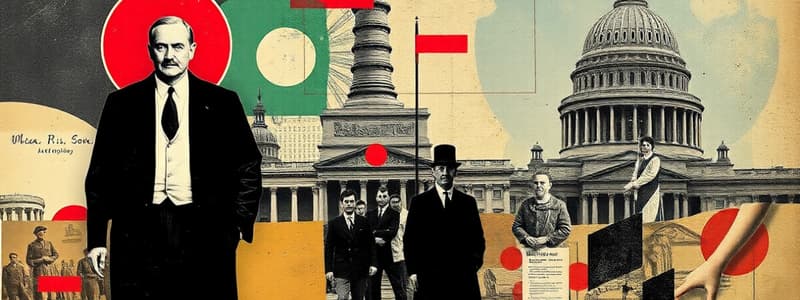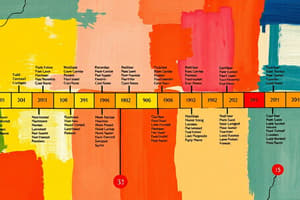Podcast
Questions and Answers
Quel est le terme qui décrit l'important événement qui a changé le cours de l'histoire dans la société moderne?
Quel est le terme qui décrit l'important événement qui a changé le cours de l'histoire dans la société moderne?
- Renaissance
- Révolution industrielle (correct)
- Société feodale
- Guerre civile
Qui est reconnu comme l'une des figures importantes ayant contribué à la science moderne?
Qui est reconnu comme l'une des figures importantes ayant contribué à la science moderne?
- Aristote
- Galilée (correct)
- Lumière
- Napoléon
Quel concept est lié à l'émergence de la philosophie moderne?
Quel concept est lié à l'émergence de la philosophie moderne?
- Humanisme (correct)
- Déterminisme
- Scepticisme
- Positivisme
Quel événement est considéré comme le début des Temps modernes?
Quel événement est considéré comme le début des Temps modernes?
Qui a initié la Réforme protestante?
Qui a initié la Réforme protestante?
Flashcards
QCM (Question à Choix Multiple)
QCM (Question à Choix Multiple)
Une question à choix multiple où les étudiants doivent choisir la bonne réponse parmi plusieurs options.
QRC (Question à Réponse Courte)
QRC (Question à Réponse Courte)
Une question à réponse courte qui nécessite une réponse écrite concise.
Évaluation
Évaluation
Un ensemble de questions qui testent la compréhension et les connaissances d'un sujet.
Concept important
Concept important
Signup and view all the flashcards
Personnage important
Personnage important
Signup and view all the flashcards
Study Notes
Vocabulary Terms
- Absolute Monarchy: A system of government where a single ruler holds absolute power.
- Alliances: Agreements or pacts between nations to support each other.
- Bias: A particular preference or point of view that might influence judgements.
- Cholera: An infectious disease.
- Colony: A territory under the control of another nation.
- Constitutional Monarchy: A form of government where the monarch's powers are limited by a constitution.
- Credible Source/Reliability: A source of information that can be trusted and verified.
- Declaration of the Rights of Man and Citizen: A document establishing fundamental rights.
- Democracy: A form of government where power is held by the people.
- Divine Right of Kings: A belief that a ruler's authority comes directly from God.
- Estate (French Revolution): Social classes in pre-revolutionary France.
- Geocentric Theory (Model): A model of the universe where Earth is at the center.
- Heliocentric Theory (Model): A model of the universe where the sun is at the center.
- Imperialism: The policy of extending a nation's power through diplomacy or military force.
- Labor unions: Organizations representing workers' rights.
- Militarism: A belief in the use of military power.
- Nationalism: A strong sense of national identity and loyalty.
- Natural Rights: Inherent rights, not dependent on laws.
- Primary Source: Original documents or artifacts providing firsthand accounts.
- Protectorate: A state protected by another state.
- Social Contract: An agreement between the governed and their rulers.
- Social Darwinism: Social theory applying "survival of the fittest" to society.
- Sphere of Influence: An area where a powerful nation exerts control.
- Thesis: A statement or idea to be proven or argued.
Important People
- Cesare Beccaria: Italian jurist and philosopher.
- Simón Bolívar: South American revolutionary leader.
- Napoleon Bonaparte: French military leader and emperor.
- Nicolaus Copernicus: Polish astronomer.
- Galileo Galilei: Italian astronomer and physicist.
- Thomas Hobbes: English philosopher.
- John Locke: English philosopher.
- Emperor Menelik II: Emperor of Ethiopia.
- Baron de Montesquieu: French philosopher.
- Sir Issac Newton: English physicist and mathematician.
- Mangal Pandey: Indian soldier, important figure in the Sepoy Mutiny.
- Rani Lakshmi Bai: Indian queen.
- Jean-Jacques Rousseau: Genevan philosopher.
- Adam Smith: Scottish economist.
- Queen Mother Yaa Asantewaa: Queen mother of the Ashanti people.
- Gavrilo Princip: Serbian nationalist.
- Archduke Franz Ferdinand: Austrian Archduke.
Important Events & Concepts
- Analyzing Political Cartoons: Understanding visual representations of political events or ideas.
- Challenges to traditional ways of thinking: Shifting perspectives on the world.
- Protestant Reformation: Religious movement.
- Enlightenment/Age of Reason: A movement emphasizing reason and scientific thought.
- Effects of the Enlightenment on the American Revolution: How Enlightenment ideas influenced the American Revolution.
- French Revolution: A period of radical social and political change in France.
- Latin American Revolutions: Wars of independence in Latin America.
- Citizens: People belonging to a particular state or nationality.
- Causes and effects of Industrial Revolution: Factors and results of industrialization.
- Effects on all social classes and men/women/children: Impact on various groups during the industrial period.
- Causes and effects of Imperialism: Contributing factors and consequences of empire building.
- Boxer Rebellion: Chinese uprising against foreign influence.
- Napoleonic Code: Laws established by Napoleon Bonaparte.
- White Man's Burden: Belief justifying Western imperialism.
- Meiji Restoration: Period of modernization in Japan.
- Successes and failures in resisting imperialism: Examples and reflections on anti-imperialist movements.
- MAIN Causes of World War I: Key factors initiating World War I.
- Powder Keg of Europe: Tension in Europe and its relationship to the causes of WWI.
- Contributions of colonies during WWI: Roles played by colonies in WWI.
- Major provisions of the Treaty of Versailles: Key clauses from the treaty.
- How it affects Germany: Impact of the treaty on Germany.
- Armenian Genocide: A historical event of mass killing.
Studying That Suits You
Use AI to generate personalized quizzes and flashcards to suit your learning preferences.




